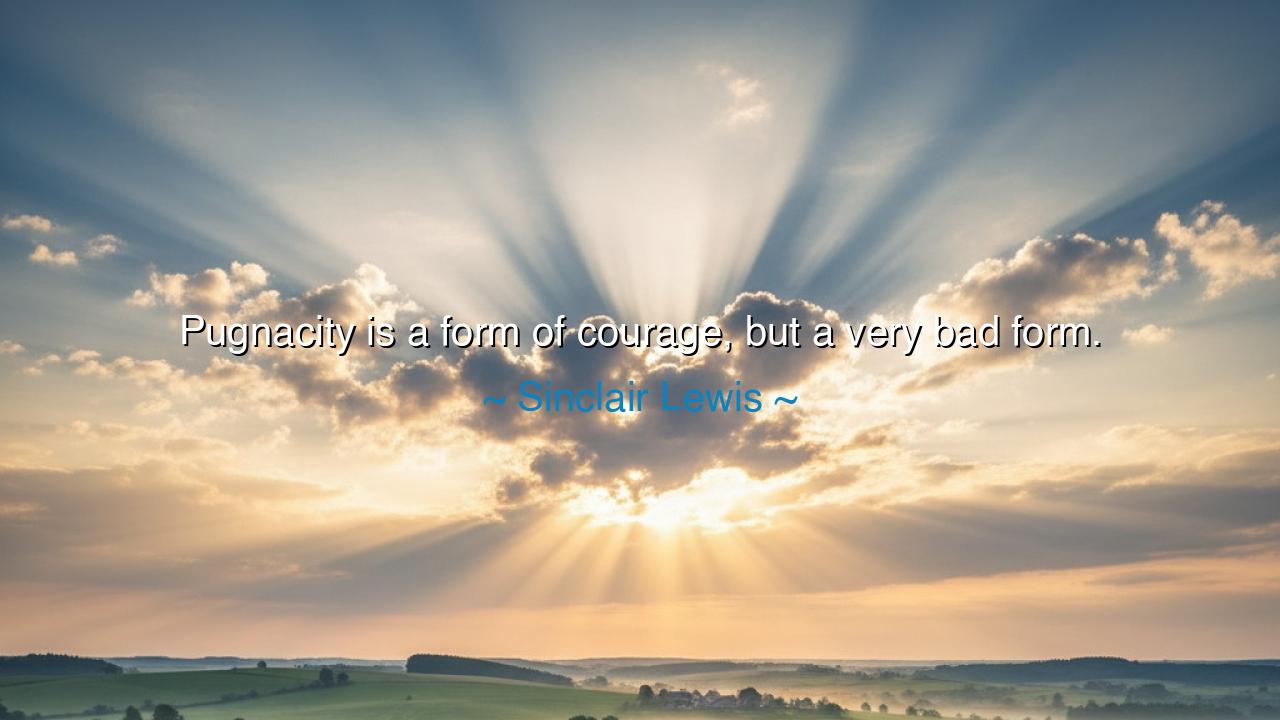
Pugnacity is a form of courage, but a very bad form.






“Pugnacity is a form of courage, but a very bad form.” These words, uttered by Sinclair Lewis, cut to the core of the human spirit. They speak not against courage itself, but against its distortion—against that fiery pugnacity, that restless impulse to fight for the sake of fighting. Courage, in its noblest essence, is the steadfast strength of one who faces peril for truth, justice, or love. But pugnacity is its shadow—a counterfeit courage that springs not from virtue but from vanity, from the hunger to dominate rather than to defend. Lewis, in his wisdom, warns us that even the brave can lose their way when their courage becomes intoxicated with aggression.
In the ancient world, there were many who mistook pugnacity for valor. Consider Achilles, the mightiest of the Greeks. His courage was unmatched, yet it was poisoned by wrath. When his pride was wounded, he withdrew from battle, and countless lives were lost. When he returned, his vengeance burned brighter than his honor. Achilles was both glorious and tragic—his pugnacious courage won him eternal fame, but it also led him to desecrate the body of Hector, dragging it behind his chariot in blind fury. Thus, his story endures not only as a tale of heroism, but also as a warning: courage, when corrupted by rage, becomes a very bad form indeed.
True courage is calm, deliberate, and guided by wisdom. It does not need to shout, nor to prove itself through constant conflict. The wise warrior knows when to fight and when to stay his hand. He knows that restraint is not weakness, but mastery. The pugnacious man, on the other hand, lives in perpetual battle—with others, with the world, and with himself. He mistakes loudness for strength and confrontation for power. Yet such a man wears himself thin, for his courage has no cause, only impulse. He seeks foes where there are none, and in the end, his greatest enemy is his own unresting heart.
Let us look upon a gentler strength—the courage of Abraham Lincoln, who faced a nation divided not with the sword, but with endurance and faith. During the darkest days of the American Civil War, when his own advisers urged vengeance and his critics howled for blood, Lincoln’s courage was not pugnacious but patient. He bore insult and doubt with quiet dignity, trusting that moral purpose would outlast fury. He taught us that the mightiest heart is not the one that strikes first, but the one that endures longest. His was the courage of compassion—the power to act without hatred.
So, too, in our daily lives we face battles both small and great. It is easy to mistake anger for strength, to believe that to speak the loudest is to stand the tallest. Yet the world does not need more fighters—it needs more builders, healers, and peacemakers. To be courageous is not to dominate but to uplift, not to conquer but to preserve what is right. The pugnacious spirit burns hot and bright, but it consumes its bearer; true courage glows steady and eternal, guiding others through the darkness.
The lesson, then, is clear: temper your fire with wisdom. Let your courage be born of conviction, not of combativeness. When your heart stirs with the urge to fight, ask yourself—what do I defend, and why? If the answer is pride, then silence is your nobler path. But if the answer is truth, justice, or love, then rise—and fight not in hatred, but in honor. For courage without virtue is chaos, but courage with virtue is divine.
In your own life, practice this: speak firmly but not cruelly, stand strong but not stubbornly, resist evil but not humanity. Learn to pause before you strike, and in that pause, listen to the quiet voice of conscience. It is there that true courage is born—not in the clamor of conflict, but in the stillness of purpose. Let others see in you the calm flame that warms, not the wild blaze that destroys.
Thus, remember Sinclair Lewis’s warning. Pugnacity is indeed a form of courage, but it is courage untamed, unruled by the spirit. It is the beast without its rider, the storm without its harbor. Master your own fire, and you will find that the greatest battles are not those fought with fists or words, but those won within the soul.






AAdministratorAdministrator
Welcome, honored guests. Please leave a comment, we will respond soon